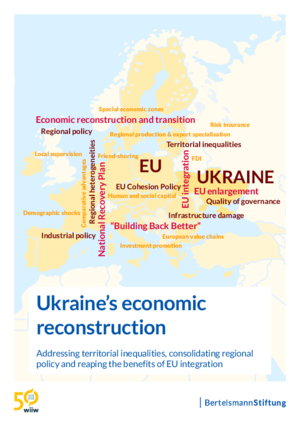Ukraine’s economic reconstruction - Addressing territorial inequalities, consolidating regional policy and reaping the benefits of EU integration
Artem Kochnev, Miriam Kosmehl, Michael Landesmann, Ambre Maucorps, Bernhard Moshammer and Stefani Weiss
Joint Study No. 2023-12, December 2023
in cooperation with BertelsmannStiftung
60 pages including 6 Tables and 9 Figures
Russia’s 2022 invasion of Ukraine and the subsequent allout war have amplified the dramatic regional reorientation of Ukraine’s economic activity that began in 2014. The causes go from severed commercial links with Russia to trade blockades following the occupation of Ukraine’s eastern regions by Ukraine’s largest neighbour, all of which resulted in redirecting Ukraine’s trade towards the EU. With the all-out war has come the unevenly spread destruction of production facilities – exacerbating regional inequalities. Meanwhile, the EU has abandoned its balancing act between neighbourhood and enlargement policies and embarked on a path leading to membership for Europe’s second-largest country. For the twin Herculean tasks this entails – economic reconstruction and EU integration – a regional perspective will have to be an important focus. “Building back better” requires structural changes that, in turn, must be aligned with Ukraine’s regional inequalities. This study sets out to examine differences in Ukrainian regional industrial structures and explores potential for industrial specialisation and growth as well as suitable policy mixes for economic development during and after the war, with a particular focus on regional and industrial policy. To identify patterns in regional specialisation, we pinpoint the most promising structure of economic activities – with a focus on the tradable sector – for supporting post-war growth. We look at EU Cohesion Policy funds as models for shaping Ukraine’s reconstruction and drawing lessons from the experience of regional policy elsewhere in the EU. We show that Ukraine’s National Recovery Plan and the objectives of EU Cohesion Policy are comparable both in scope and goals. At a time of shifting investment priorities, the EU should leverage its strong economic and financial influence so that reconstruction and economic policy contribute to developing Ukraine’s comparative advantages and encourage its integration into European value chains.
Keywords: Ukraine, Regional development, Regional policy, EU integration
JEL classification: O52, O57, R11, R12, R58, F02, F15
Countries covered: EU, Ukraine
Research Areas: Macroeconomic Analysis and Policy, Labour, Migration and Income Distribution, International Trade, Competitiveness and FDI, Regional Development
